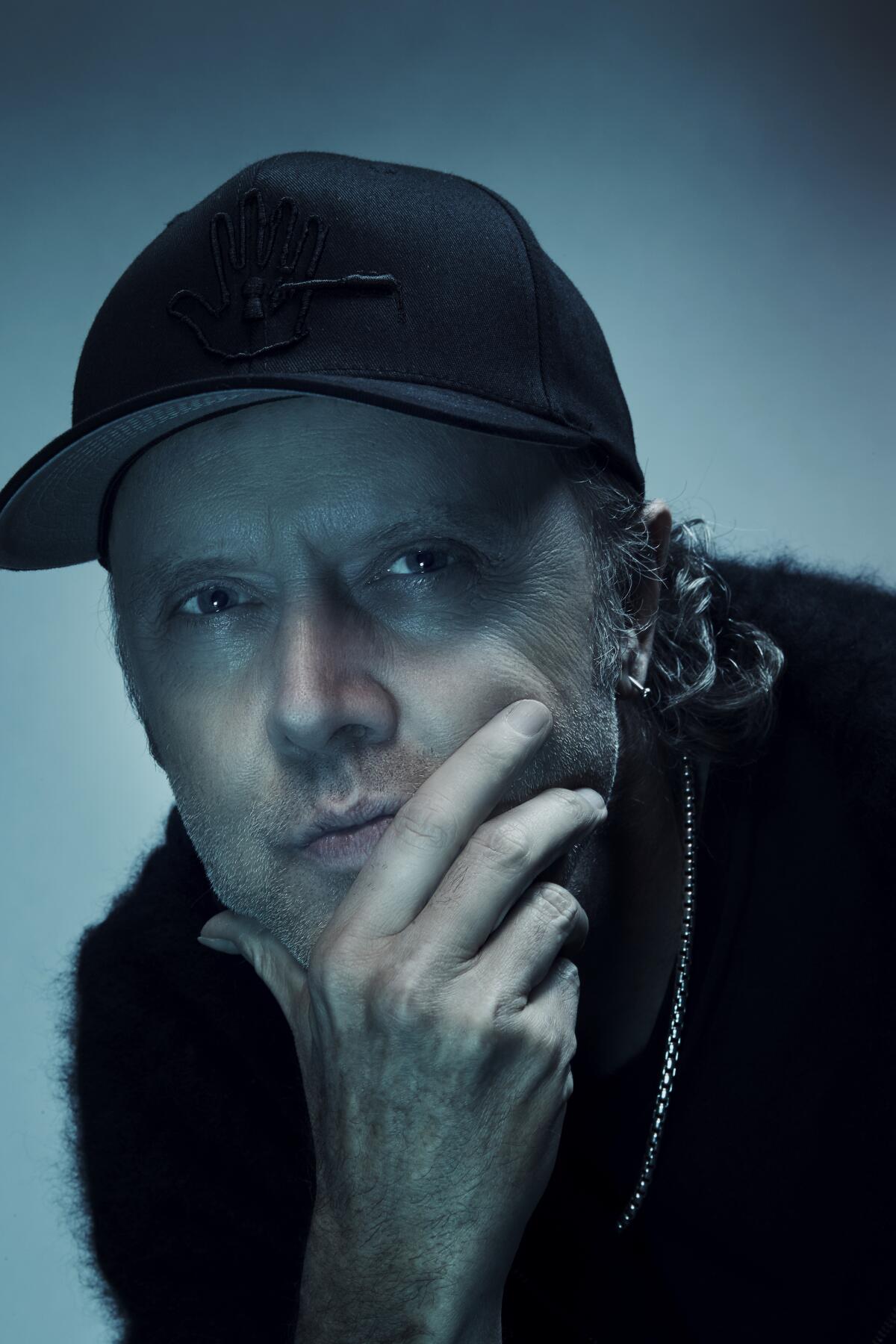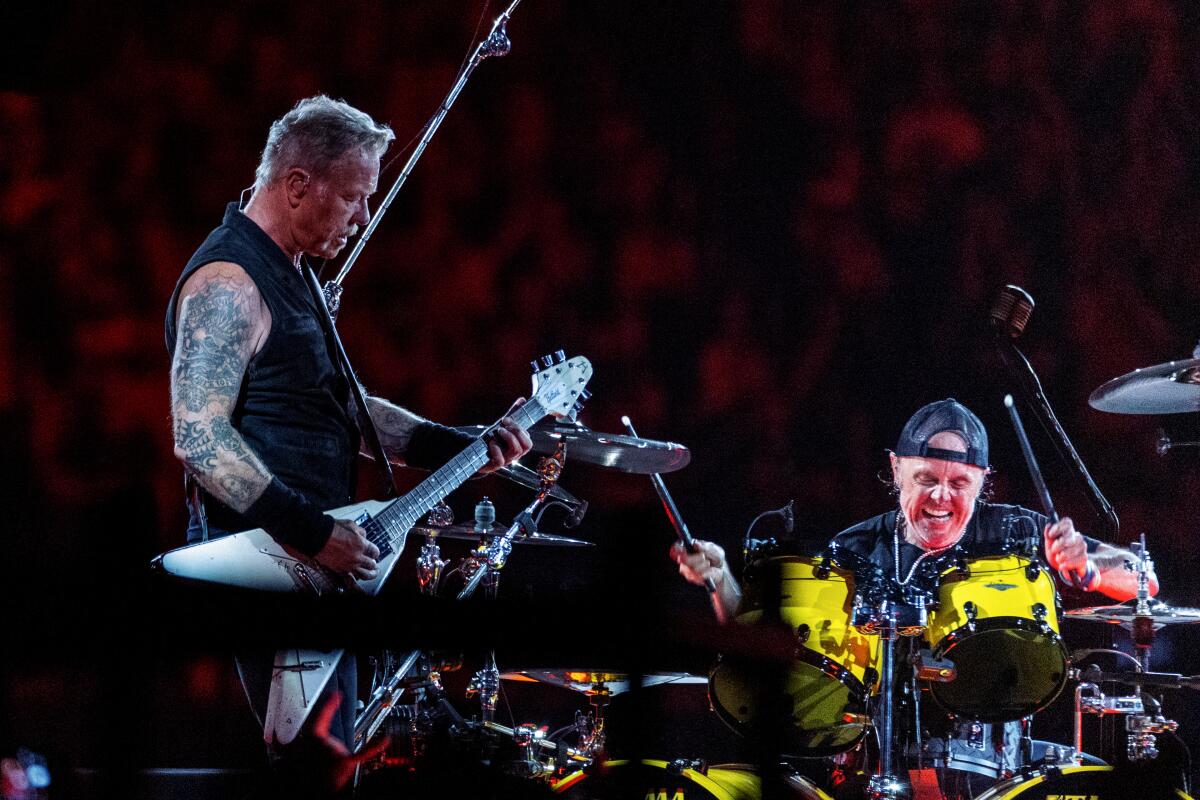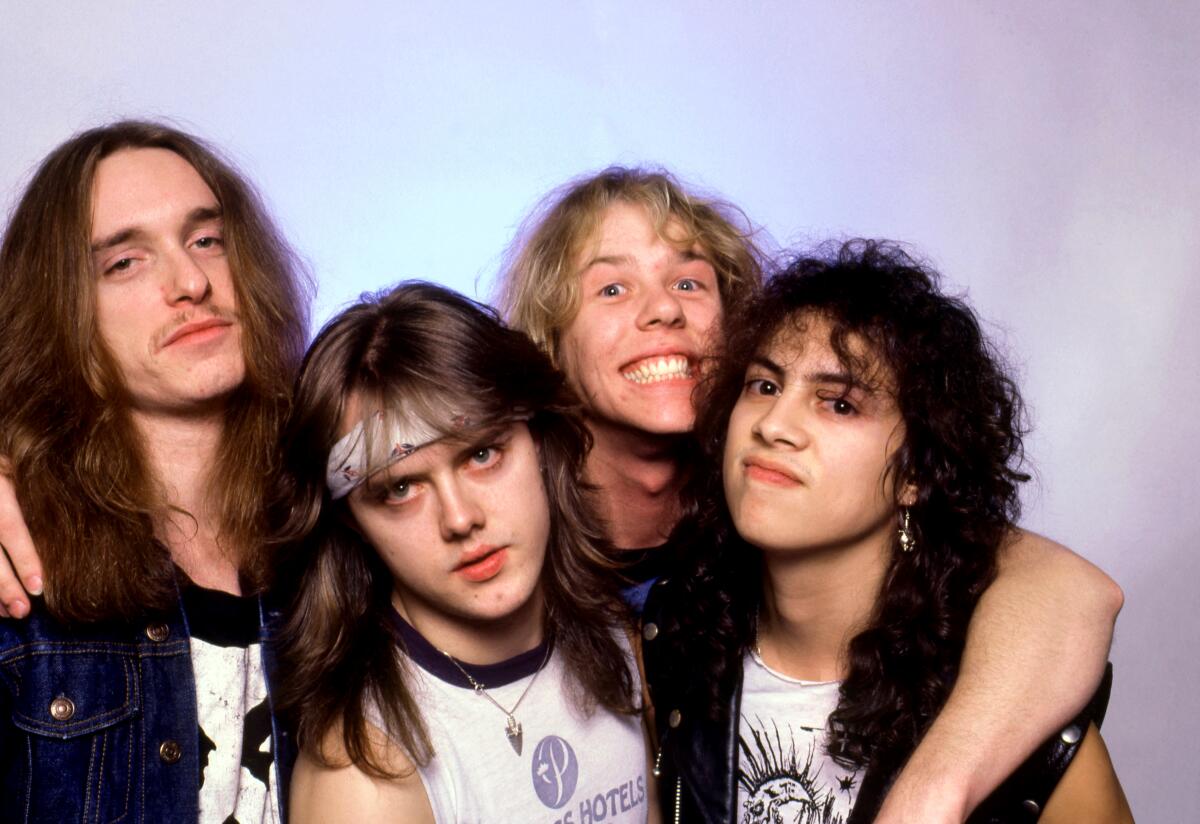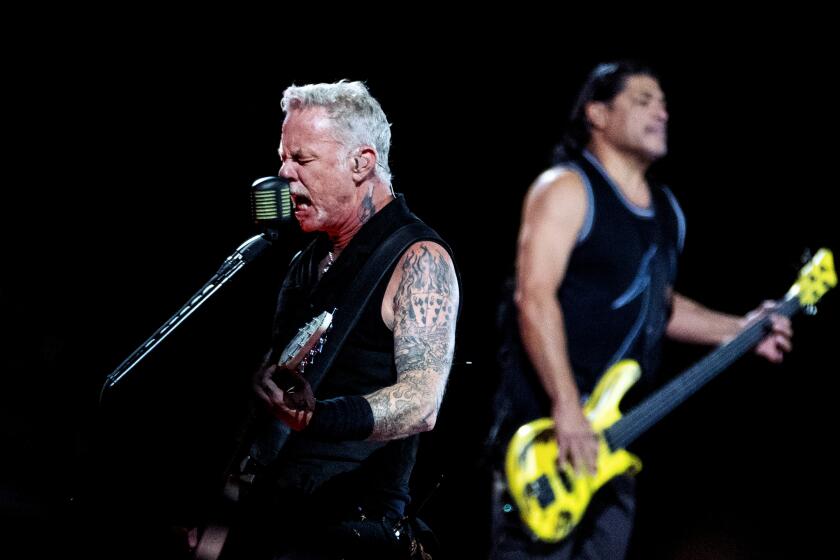‘Awe-inspiring’: Lars Ulrich on Power Trip, friendship and 40-plus years of Metallica

- Share via
Metallica is accustomed to operating at a massive scale, filling stadiums worldwide with epic heavy-metal riffs and monster drum beats. But between tour dates, things can quickly return to human size, as drummer Lars Ulrich suggested in a recent call from his home in San Francisco. A few hours earlier, he found himself distracted by a fast-approaching appointment to chaperon his teenage son to his driver’s license test.
“I was kind of freaking out,” Ulrich said, but all went well. “There is an additional driver now on the streets of California. Hallelujah.”
Ulrich is far less nervous onstage. Weeks earlier, Metallica finished a series of summer stadium dates across North America in support of its 11th studio album, “72 Seasons,” getting a workout on an expansive stage that had band members spread out at different points in the night, with Ulrich moving among four drum kits. The tour included two sold-out shows at SoFi Stadium in August.
“It’s all mind boggling,” said Ulrich, in his usual talkative mood. “A couple of us in the band just turned 60, and two of us are knocking on the door.” (Ulrich will turn 60 in December.) “As you get older, you open your eyes, you take it in, you’re appreciative. But I’m kind of in disbelief that this is still connecting at the level that it’s connecting.”
At the second of two sold-out shows, heavy metal stalwarts Metallica challenged themselves and their audience, with thunderous results.
Metallica is back in SoCal this weekend as the closing act at the Power Trip festival, a hard rock and heavy metal summit set to unfold Oct. 6-8 at the Empire Polo Club in Indio. Sharing the bill with Metallica are five other ear-shattering headliners: Guns N’ Roses, AC/DC, Tool, Judas Priest and Iron Maiden.
The Coachella site is a familiar one for Metallica, which hosted its own Big 4 festival there in 2011, alongside other originators of thrash metal: Slayer, Megadeth and Anthrax. All but New York’s Anthrax were formed in Southern California in the 1980s, though Metallica soon fled to San Francisco after finding only indifference amid the hair metal scene of the Sunset Strip.
“It’s nice to be back,” Ulrich says of Power Trip. “I’m such a believer in the rock community, and we have relationships with every single one of the other bands, both as music fans and as friends.”
Metallica is still led by Ulrich and singer-guitarist James Hetfield, who co-founded the band in 1981. With longtime lead guitarist Kirk Hammett and, since 2003, bassist Robert Trujillo, the band has sometimes alarmed purists with surprising left turns — recording ballads, collaborating with Lou Reed, members cutting their hair. “72 Seasons” is the third in a series of albums to dive back into bruising thrash textures, following 2008’s “Death Magnetic” and 2016’s “Hardwired... to Self-Destruct.”
In the 1980s, thrash was among the most confrontational, underground sounds in rock. Now even NASA has used the band’s hyperactive “Fuel” to announce a future manned mission to the moon. And last year, Metallica was unexpectedly at the center of a major pop-culture moment when its 1986 song “Master of Puppets” was included in the Season 4 finale of Netflix’s “Stranger Things,” leading to a 650% bump in streams on Spotify the following week.
It proved once again that Metallica can still grab the attention of a new generation of listeners.

Metallica has played many festivals over the years. What makes Power Trip special?
I went to [Indio’s] Desert Trip in ‘16 with the Rolling Stones, Paul McCartney and Neil Young and the rest of that incredible lineup. It was so cool, because it was different than other festivals. My wife and I have been going to Glastonbury [in England] every year. We’ve been to Coachella many times, and to Lollapalooza. But Desert Trip was just the headliners on one stage. It’s a great site, with a lot of music history. Subsequently, there was some chatter about doing a hard rock version; the offer finally came in six or nine months ago. As a fan of hard rock, I’m going to be there the whole weekend and see every band.
Some of the bands on the bill started years before Metallica and provided you some inspiration. Is there anything you’re especially looking forward to?
We love all five of the other bands. I saw AC/DC back in Copenhagen in 1977 for the first time; we did a whole tour with them in Europe in 1991. I fell in love with Guns N’ Roses five seconds after I heard “Mr. Brownstone” for the first time on KNAC before the [1987 debut] album came out. We played shows with Iron Maiden in the ’80s. We played shows with Judas Priest. We played shows with Tool all over the place. Obviously, AC/DC, Iron Maiden and Judas Priest were huge influences. Those three bands are a significant part of the reason that we wanted to be in a band. So to get everybody together in the same space is a bit awe-inspiring.
The Rolling Stones are about to put out an album, and those guys are all around 80. Do you foresee Metallica having that kind of longevity?
I think mentally we could do this for another 20 years. It’s more about the shoulders and the necks and the throats and the fingers and the wrists — the physicality of it — whether we can just stay healthy. That is a bit of a crapshoot.
A lot of people have seen the 2004 “Some Kind of Monster” documentary and the personal fireworks that erupted onscreen, but obviously, your partnership with James has lasted for a reason. What has kept that going?
We love each other, and we love being in Metallica more than anything else. Other than my dad and a few family members in Denmark, James is the longest relationship I’ve ever had. So when I look over at him, I get very emotional about the fact that we’re still out here playing and doing this with Kirk and Rob. We had two incredible shows at SoFi Stadium in L.A. a couple weeks ago, which I think are the biggest shows we’ve ever played in L.A. and are probably only 15 miles from where we started down the road in Norwalk. It’s pretty insane that this is still connecting to fans at this level — and post-pandemic and lockdown, and the uncertainty and devastation of that time.

Do you feel that uncertainty in the music of “72 Seasons”?
I don’t have enough distance yet from the process to really get into the analogies. Somewhere in there is a correlation between how vulnerable and helpless you felt at the time. A little while into the lockdown, we tried to roll up our sleeves and say, “Let’s get busy with writing songs and doing what we do, and try to find a way for people to access our music so it can play whatever role it needs to play in this terrible, devastating, uncertain time.” That was the energy the record was born out of — as we were sitting behind computers along with our producer Greg [Fidelman] in five different places in the world, trying to figure out how to create music and how to be productive — [until] we ended up in our studio here in Northern California a year later.
Metallica often stood out by stepping outside the metal world — playing Lollapalooza when it was identified as an alternative rock festival, working with art photographers like Andres Serrano, recording an album with Lou Reed. How important was that impulse to your progress?
It’s an important part of our DNA. I grew up around a lot of jazz, a lot of blues, a lot of pop. I grew up around reggae. From my dad, in the household, it was jazz that was playing mostly: John Coltrane, Dexter Gordon, Charlie Parker, Ornette Coleman, Sonny Rollins.
Kirk, Rob and James each had their own version of that, and that’s what we bring to the table. We’ve never been shy about the fact that we’re very musically curious creatures and have always, for our own sanity and survival, needed to turn over rocks and see what lies underneath them.
Metallica’s social media was recently marking the 20th anniversary of “St. Anger,” the creation of which was captured in “Some Kind of Monster.”
When you’ve been around as long as we have, there’s an anniversary about every three days [laughs]. We try to give all the things we’ve done equal anniversary billing.
There were strong reactions to that album, but Metallica seems to attract intense reactions to whatever you do.
There’s a lot of passion around Metallica. It’s part and parcel of being in this band. We’re sort of used to that.
But you’ve seemed unflappable throughout. You haven’t changed course because a particular group of people are shouting about a record.
No, it’s pretty much been like that since the beginning. When we started off, the kind of music we were doing didn’t fit into what was going on on the Sunset Strip in 1982. Everyone disregarded us. When the intro of “Fade to Black” played on the “Ride the Lightning” album [in 1984] there was a whole s— storm about how dare we have an acoustic guitar on a so-called thrash metal album. It’s been like that for 40-plus years.
We’ve always charted our own course. We all lived in this world that was not accepted by the mainstream. We were all just looking for something to belong to. Being an only child, I didn’t have anything to hang onto. So being in a band, being with James, being part of a scene of like-minded outcasts and misfits gave me a sense of belonging and a sense of identity. My path will be forever tied to Metallica’s path. It’s the only path that I’ve ever been on.
More to Read
The biggest entertainment stories
Get our big stories about Hollywood, film, television, music, arts, culture and more right in your inbox as soon as they publish.
You may occasionally receive promotional content from the Los Angeles Times.











